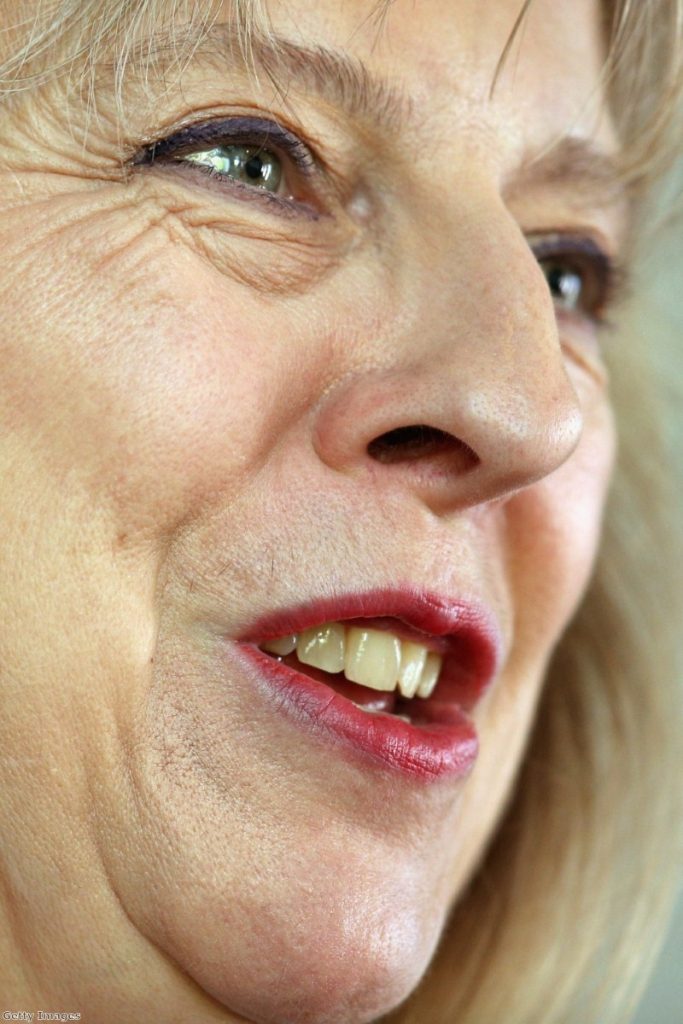Theresa May under fire for plans to make Brits stateless
By Ian Dunt and Adam Bienkov
Theresa May came under attack from all sides today after calling for new powers to strip British subjects of their citizenship and leave them stateless.
Under the proposals, nationalised British subjects could be stripped of their passports if the home secretary believes they are acting in a way which "seriously prejudices" the national interest.
Citizens will not even need to be convicted of a crime in order to lose their citizenship.
The home secretary's last-minute amendment to the immigration bill is likely to put her into conflict with the UN and runs against the current of human rights law since the end of World War Two.
The move, which would only apply to people born outside the UK, may contradict the UK's responsibilities under the 1954 United Nations convention relating to the status of stateless persons.
It may also be against a variety of regional and international human rights treaties which guarantee the right to nationality, with special protections for stateless people.
It also raises the question of what would happen to the children of anyone stripped of their British nationality. The 1989 UN convention on the rights of the child obliges states to ensure every child acquires a nationality.
In a move which will outrage human rights activists, the decision to strip Brits of their citizenship could be made in secret courts which are closed to the public.
"Citizenship is a privilege, not a right. These proposals will strengthen the home secretary's powers to ensure that very dangerous individuals can be excluded if it is in the public interest to do so," immigration minister Mark Harper said.
Human rights charity Reprieve said the development was "alarming" and warned the home secretary could "tear up people's passports without any need for the kind of due process".
The amendment came under attack from all sides of the House today, including a number of Conservative MPs.
"The way in which this is expressed gives enormous power to the secretary of state," Conservative MP Bill Cash said today adding that "there a danger that we might be regarded as the nasty party if we put this into effect."
Other Conservative MPs welcomed the proposal however and even urged the home secretary to extend the powers to all British citizens.
"Could I suggest to her… perhaps you should be looking to go even further and have similar sanctions against anyone who is British, irrespective of how they got it, if they do something that is so heinous against the british state?" Tory MP Alok Sharma suggested.
Theresa May said she wanted to be able to take action against those "who are acting in a manner that is not conducive to the public good and who are acting in a manner that is seriously prejudicial to the nation's interests."
The move was backed by Liberal Democrat leader Nick Clegg who said it would only apply in "a tiny number of cases."
He added: "I think it is right that for us as a country to say that if we have given you citizenship and it's shown you actually want to harm your fellow British citizens then you can't keep on having that citizenship"
However, Liberal Democrat MP Sarah teather spoke out against the new measures saying they would place the UK in a "roll call of dishonour" on the world stage.
"Making people stateless is simply wrong," she said.
"I have to say that I'm frankly aghast that my own party has been willing to sign up to this and I would strongly encourage my colleagues to go in the no lobby against this clause."
Shadow Home Office minister David Hanson said that Labour would consider supporting May's proposals but said they would need longer to consider the impact of any new legislation.
May's last-minute addition to the 50 government amendments used up much of the Commons time allocated to the bill, which had been set to see potentially substantial backbench rebellions.
Under convention, government amendments have to be debated before backbench amendments. This led one Tory MP to complain that the government was trying to time-out potential rebellions.
"It is unusual for the home secretary to be fillibustering her own bill," Tory MP Peter Bone suggested.
The parliamentary tactic reflects David Cameron's effort to prevent any more Commons defeats ahead of the general election, as he desperately tries to present the image of a united party.
Nigel Mills' demand for restrictions on Bulgarians and Romanians to be extended had the support of at least 70 MPs, but was unlikely to win a Commons vote due to opposition from Labour, the Liberal Democrats and the government.
In an extraordinary move, Conservative members of the government were told to abstain on an amendment by Dominic Raab attempting to remove the right of foreign criminals facing deportation to make an appeal based on their right to a family life.
This was despite the fact that Theresa May had already said the amendment would have seen the UK come into conflict with the European Court of Human Rights.
Almost 100 MPs supported Raab's amendment anyway.
In a bid to head off a rebellion, Tory whips pushed backbenchers to back compromise amendments tabled by Stephen Phillips, which would force the home secretary to assess whether EU immigration is excessive and the likely effects of new countries joining the EU.
The immigration bill has caused outrage among civil liberties groups with its demand for driving instructors, private landlords, GPs and others to check people's immigration status.
There are also complaints about restrictions on appeals in immigration cases, given the often-haphazard nature of the decisions made by the Home Office.
The third reading of the Immigration Bill passed by 295 votes to 16 against.





-01.png)